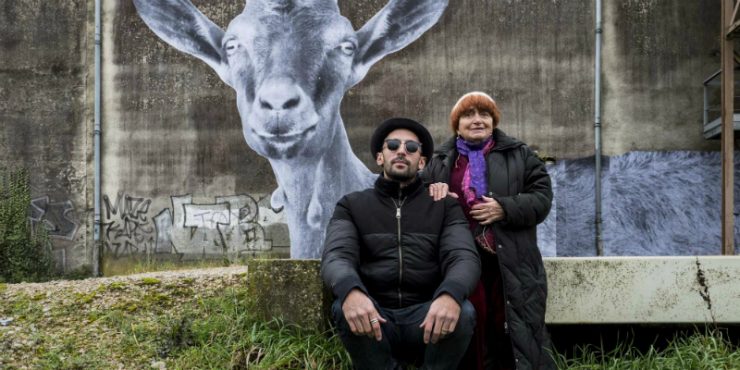Agnès Varda is one of the last living vestiges of the French New Wave that transformed cinema in the 1960’s. Varda’s place within the movement has mostly taken a backseat to the more front-and-center legends like Jean-Luc Godard and François Truffaut, her placement as one of the few women within the group probably not doing her many favors. Varda’s films were less revolutionary than her more popular peers, but while their obsessions lie within the functions of cinema, Varda was most interested in the people she documented. Her latest movie, Faces Places – directed with posh photographer JR – is a testament to her career, as well as a remarkably sweet film about the nature of memory and the power of images.
Varda and JR’s unconventional friendship (she’s more than fifty years older than him) is almost an afterthought. Both artists have a fondness for portraiture. Varda, within her films both narrative and documentary, and JR in his evocative photography. Admirers of each other, their goal is to go through the lesser-seen alcoves of France – from the shipping docks, to abandoned neighborhoods, to a beached German bunker left over from the last world war – and get photos of the residents, old and new, and show them on a large scale. Their quirky investigations and dialogues meet little resistance from the people they meet. Images is how these two artists choose to see the whole world, and the rest of the world seems content to help them keep seeing.
Faces Places‘ best moments are imbued with Varda’s innate ability to find the humanity in everything she sees. Sometimes she turns that camera on herself, which is where the participation of JR is crucial: he allows Varda to be a willing subject when he takes the photographs. Faces Places will remind some of Jean Rouch’s Chronicle of a Summer, one of the New Wave’s best documentaries. Both films are incredibly coy about the deceitful nature of nonfiction filmmaking, while filling its film with such splendid, candid human moments. Both movies capture the rebellious, playful spirit of the French New Wave without the ego and megalomania that occasionally came with the New Wave’s obsession with the auteur.
The movie expertly plays with our own love of nostalgia, while also playing against our own nostalgia toward Varda as her career creeps slowly towards its end (last week, Varda became the oldest person ever nominated for a competitive Academy Award, at 89). JR’s influence is strong – after all, he is the creator of the film’s powerful, large images seen throughout – but Faces Places is a Varda film through and through. It has all the hallmarks of both her heart and her heartbreak. The film’s recent nomination for Best Documentary Feature might make this the most seen Varda film in America. It’s a wonderful introduction to such a film legend, and welcome invitation to visit her past work which stands strong with her most popular peers.
Directed by Agnès Varda and JR










